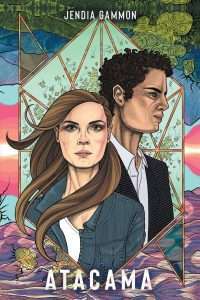REVIEW: Atacama by Jendia Gammon
Last Updated on May 1, 2025
Expanding upon an idea first introduced in her short story collection, The Shadow Galaxy, Jendia Gammon’s cosmic horror thriller, Atacama, takes readers on a chilling journey that begins with a seemingly innocuous sample taken from the Atacama Desert by a university research team.
 The specimen’s nature quickly becomes the central mystery, as a professor and a student’s initial encounter with it yields dire consequences. Atacama’s opening chapter introduces the novel’s most fascinating element: its ability to create a genuinely unsettling experience.
The specimen’s nature quickly becomes the central mystery, as a professor and a student’s initial encounter with it yields dire consequences. Atacama’s opening chapter introduces the novel’s most fascinating element: its ability to create a genuinely unsettling experience.
It’s always exciting to see an author extending a preamble, especially one cloaked in impending doom.
The uncanny atmosphere of Atacama’s opening chapters permeates both the novel’s cosmic horror elements and its protagonist, Fiona Hawthorne, a research student grappling with her best friend’s recent death and the gradual dissolution of her engagement.
Seeking to find the truth behind this sudden death, Fiona begins her journey as isolated as the desert the novel is named after, but with help from a long-absent university friend, she evolves alongside her grief. Her personal experience complements the otherworldliness of the alien elements, touching on that intersection of self, intimacy, and the preternatural that is so intrinsic to the horror genre.
Gammon excels at portraying the encounters with the alien entity with creativity and an authentic sense of wrongness. Its peculiar characteristics also added an eerie dimension to the narrative that kept me on edge.
Sudden and forced interactions with the alien and the horrific repercussions of its behavior highlight its profound otherness, making each confrontation deliciously creepy, but my appetite for these moments wasn’t fully satisfied.
Atacama focuses on character development, crafting a personal story about coping with sudden grief and moving forward—albeit with a terrifying alien complication. The protagonist’s emotional journey forms the narrative’s backbone, giving weight to the supernatural elements before eventually overshadowing them until they feel secondary.
As the novel progresses, the narrative imbalance between the more mundane, personal scenes versus the alien encounters creates an uneven reading experience. Additionally, the romantic subplot unfolds too quickly—Fiona’s abrupt transition from a broken engagement to a new relationship with said friend she recently reconnected with feels rushed and undermines the emotional authenticity established by the other elements of the story. Although this plot point does get addressed in the endgame, and its existence does make a case for the difficulty we have putting our first foot forwards by ourselves when dealing with our grief, it does stand in the spotlight for enough time to slow down everything else around it.
Moreover, despite the title’s implication, the Atacama Desert only appears in the final stages, with Fiona spending minimal time in this expectedly central location, one whose predominance I hoped would add to the uncanniness of the story and play with more than one kind of horror of isolation.
Despite this, I thoroughly enjoyed the alien aspects of this novel, smartly crafted, making Atacama a compelling read for fans of sci-fi horror.
Although I wished for better pacing and deeper romantic development, Atacama delivers an unsettling exploration of grief through a distinctly extra-terrestrial lens, and Gammon’s talent for crafting alien entities and exploring their interaction with human vulnerability makes the novel an entertaining addition to the cosmic horror genre.
Read Atacama by Jendia GammonThe post REVIEW: Atacama by Jendia Gammon appeared first on Grimdark Magazine.



